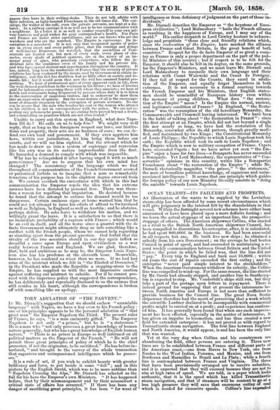TORY ADULATION OF "THE PARVENU."
Ix Mr. Disraeli's suggestion that we should eschew " unamiable language" with Naples, we have a key even to his French policy : one of his principles appears to be the personal adulation of " that great man" the Emperor Napoleon the Third. The present ruler of France, he says, " is a man eminently gifted." The Emperor Napoleon is not only " a prince," but he is " a statesman." He is a man who " not only possesses a great knowledge of human nature generally, but who has a great knowledge of English human nature." " There is no prince in Europe so well informed on all political matters as the Emperor of the French." " He will not permit those great principles of policy of which he is the chief promoter, if not the originator, to be sacrificed." He has before in- terfered, " and brought to the survey of the whole transaction that sagacious and unimpassioned intelligence which he posses- ses."
It is a rule of art, if you wish to exhibit beauty with greater brilliancy and force, to put beside it some "foil' ; and in this picture by the English David, which was to be more sublime than " Napoleon Crossing the Alpe," Mr. Disraeli has selected as the foil for his hero the Emperor's own Ministers. " It has happened before, that by their mismanagement and by their misconduct a critical state of affairs has occurred." If there has been any danger of sacrificing great principles, it has been " for want of
intelligence or from deficiency of judgment on the part of those in- dividuals."
Mr. Disraeli describes the Emperor as " the keystone of Euro- pean civilization"; Lord Malmesbury " hails the French alliance as resulting in the happiness of Europe, and I may say of the world." His earlier despatch to Lord Cowley hastens to acknow- ledge and propitiate "those close and friendly relations which, since the restoration of the Empire, have marked the alliance between France and Great Britain, to the great benefit of both countries." Respect for the de facto Emperor of so great a coun- try as France is only a proper deportment on the part of the pub- lic Ministers of this country; but if respect is to be felt for the Emperor, it should also be felt in its degree, on the same grounds, for the Emperor's Ministers, and we must leave Mr. Disraeli and Lord Malmesbury to reconcile their own language and their relations with Count Walewski and the Count de Persigny. If they fail of respect for the Counts, they excel in adula- tion of the Emperor, and equally forget themselves in both extremes. It is not necessary to a formal courtesy towards the French Emperor and his Ministers, that English states- men should be unmindful of European history even within the memory of young children. What does " the restora- tion of the Empire " mean P Is the Empire the normal, ancient, and legitimate condition of France? In England, " the Resto- ration' was the resumption of the old hereditary Monarchy, the Commonwealth and Cromwell having intervened. We have been in the habit of talking about " the Restoration in France" : since the first attempt at an Empire, which did not last beyond a single life nor nearly so long, we have had the restoration of the Monarchy, somewhat after its old pattern, though greatly modi- fied, and maintained by two Kings ; the Constitutional Monarchy of Louis Philippe ; the Republic to which Louis Napoleon took his oath ; the Republic which took its oath to Louis Napoleon ; and the Empire which is now in military occupation of France. Capets have succeeded Capets ; but we have never yet seen " the Em- pire" enjoy a lease for two lives—a Bonaparte has never succeeded a Bonaparte. Yet Lord Malmesbury, the representative of " Con- servative" opinions in this country, writes like a Bonapartist Frenchman about "the restoration of the Empire " ; while Mr. Disraeli rhetorically magnifies "the prince," " the statesman," the man of boundless political knowledge, of sagacious and unim- passioned intelligence I It seems that one principle which guides the foreign policy of our new Ministry literally consists in "doing the amiable " towards Louis Napoleon.


























 Previous page
Previous page